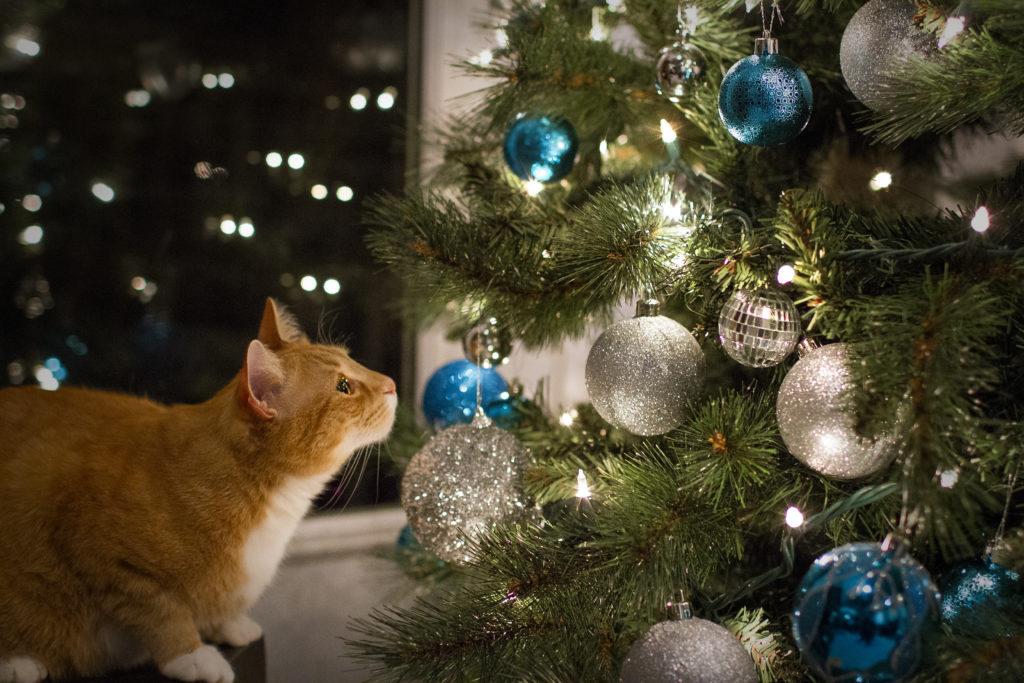Holiday Decoration Safety Tips From Veterinarians to Cats
Holiday decorations bring cats problems every year around this time, as mentioned in our blog last month. We can see that food and holiday décor, which bring us enjoyment, is often hazardous to cats. Holiday decorations in many homes can become a minefield of worry for cat owners.
We understand there is no “fun” involved in having to rush our pet to the vet. This month, we hope to share some helpful tips to keep cats safer from holiday decorations. As you will see, much of what makes the holidays so merry and bright can bring cats problems. So what’s a cat owner to do?
Experiencing Cat Trouble With the Tree
In many homes, natural and artificial trees add much excitement for the holiday season. Cats, too, find much joy in climbing in and among the branches and decorations. According to FamilyHandyman.com, there are a handful of possible safety measures. These include:
- Guard the Base
- Smells to Keep the Cat Away
- Attractive Decorations
- Tree Security
- Different Tree Types
Pine needles on natural trees can be dangerous for cats to chew. Deterrents can be as complex as a fence or gate, or as simple as aluminum foil. Keeping trees off-limits to cats might include designating one specific room that you might secure with a lock.
Tree Décor Can Cause Cat Problems
The tree may not be the only holiday decoration with dangers. Attractive ornaments and decorations, such as tinsel, ribbons, salt-dough ornaments, and more can affect our pets.
Stocking Stuffers and Pet Treats
Think about the little goodies and treats that we might have as gifts in stockings. Cats, with especially keen senses of smell, can find food items neatly wrapped for the taking. And while we are on the subject, wrapping paper and bows may appeal to cats. Keep an eye on any early gifts that you may have stuffed into stockings ahead of time.
Tinsel, Ribbons, and Ornaments
Holiday decorations that we might put on the tree and around our home can attract cats. Think of all the shiny and glittery tinsel, ribbons, garland, and ornaments. These can adorn the tree, alongside presents under the tree, stocking stuffers, and other décor.
Things that we use to brighten the house for the holidays could result in an obstruction in cats. Tinsel ingestion, for instance, can stick in their intestines and require surgical removal. Be sure to use heavy plastic cord protectors to stop cats from chewing on those hazards.
Holiday Plants: Poinsettias, Mistletoe, and Berries
Holiday plants can be hazardous to cats. Consider how and where to place poinsettias, mistletoe, and holly. If your cat chews or ingests any holiday plants, call Veterinarians to Cats. You may also reach out to the Pet Poison Helpline at 855-213-6680. There is a fee for this service, but it can help if your cat accidentally eats anything dangerous.
Review Precautions for Seasonal Plants and Holiday Decorations
Finally, the ASPCA offers some precautions that we can review to check off on our cat safety “naughty list:”
Christmas Tree: Anchor your Christmas tree securely to avoid tipping and falling injuries. Anchoring the tree helps to prevent the tree water, that may contain chemicals, from spilling and causing stomach upset. Stagnant tree water is a breeding ground for bacteria. Cats could end up with nausea or diarrhea if they drink it.
Avoid Mistletoe, Holly, and More: Holly, when ingested, can cause pets to suffer nausea, vomiting, and diarrhea. Mistletoe can cause gastrointestinal upset and cardiovascular problems. And many varieties of lilies can cause kidney failure in cats if eaten. Choose an equally festive yet safer artificial plant made from silk or plastic, instead.
Tinsel-less Town: Nibbling on tinsel can lead to a swallow, which can lead to digestive tract obstruction, severe vomiting, dehydration, and surgery.
The ‘Naughty List’ Continues
Holiday Glow: A friendly reminder to not leave lighted candles unattended. Pets may burn themselves or cause a fire if they knock candles over. Use appropriate candle holders placed on a stable surface. Put the candle out if you leave the room.
Twinkle lights may also harm your cat if they attempt to chew them when you are not around. Keep kitty safe by unplugging or switching off lights that you may have on, in addition to the candles.
Wired Up: Keep electrical items like wires, batteries, and glass or plastic ornaments out of paws’ reach. Wires can deliver a potentially lethal electrical shock, and a punctured battery can cause burns to the mouth and esophagus. Shards of breakable ornaments can damage your pet’s mouth and digestive tract.
Safety First for Cats and Other Family Members
As a rule, remember that if a holiday decoration is unsafe for children, your cat shouldn’t have access, either. You may want to download and share a helpful PDF from the ASPCA with your friends and family. Veterinarians to Cats wants all of our clients to have the happiest and safest of holidays.
Are you looking for a new veterinarian for your cats? Call Veterinarians to Cats in Roanoke, VA, at (540) 989-1400, or follow us on Facebook for updates. Our veterinarians are here to help when holiday decorations bring cats problems.

